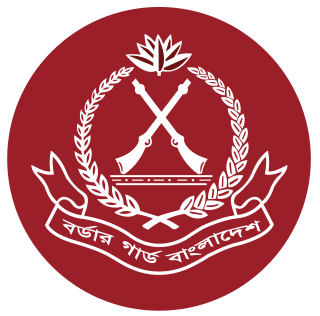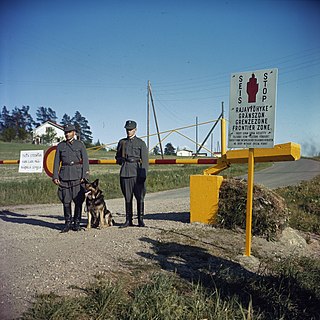
The Border Security Force (BSF) is India's border guarding organisation at its borders with Pakistan and Bangladesh. It is one of the five Central Armed Police Forces (CAPF) of India, and was formed in the wake of the Indo-Pakistani War of 1965 "for ensuring the security of the borders of India and for connected matters therewith".
Bangabhumi also known as Bir Banga, is a separatist movement to create a Bengali Hindu country for Bangladeshi Hindus in southwestern Bangladesh, envisioned by Banga Sena. Banga Sena is a separatist Hindu organization which advocates formation of a Bangabhumi for Bengali Hindus in Bangladesh. The group is led by Kalidas Baidya.

The Border Guard Bangladesh (BGB) is a paramilitary force responsible for the border security of Bangladesh. The BGB is entrusted with the responsibility to defend the 4,427 kilometres (2,751 mi) border of Bangladesh with India and Myanmar. It was formerly known as the Bangladesh Rifles (BDR).
India maintains 10 paramilitary forces.

Basirhat is a city of West Bengal, India. It is located on the banks of the Ichamati (Ichhamati) River.

Bangladesh–India relations are the bilateral relations between the People's Republic of Bangladesh and the Republic of India, both of which are South Asian neighbours. Diplomatic relations between the two countries formally began in 1971 with India's recognition of an independent Bangladesh following India's military intervention helping Bangladesh secure independence following the Bangladesh Liberation War. On 6 December, Bangladesh and India celebrate Friendship Day commemorating India's recognition of Bangladesh and the continued friendship between the two countries.

A border guard of a country is a national security agency that performs border security. Some of the national border guard agencies also perform coast guard and rescue service duties.

The India–Pakistan, Indo–Pakistani or Pakistani-Indian border is the international boundary that separates the nations of the Republic of India and the Islamic Republic of Pakistan. At its northern end is the Line of Control, which separates Indian-administered Kashmir from Pakistani-administered Kashmir; and at its southern end is Sir Creek, a tidal estuary in the Rann of Kutch between the Indian state of Gujarat and the Pakistani province of Sindh.

The Ministry of Home Affairs, or simply the Home Ministry, is a ministry of the Government of India. It is mainly responsible for the maintenance of internal security and domestic policy. It is headed by Minister of Home Affairs.

The 2001 Bangladesh–India border clashes were a series of armed skirmishes between India and Bangladesh in April 2001. The clashes took place between troops of the Bangladesh Rifles (BDR) and the Indian Border Security Force (BSF) on the poorly-marked international border between the two countries.

Camel cavalry, or camelry, is a generic designation for armed forces using camels as a means of transportation. Sometimes warriors or soldiers of this type also fought from camel-back with spears, bows, or firearms.

Sashastra Seema Bal is a border guarding force of India deployed along its borders with Nepal and Bhutan. It is one of the seven Central Armed Police Forces under the administrative control of the Ministry of Home Affairs (MHA).
Gurbachan Singh Jagat is a former governor of the State of Manipur in India. He was appointed to this office on 1 July 2007 and retired as the governor on 22 July 2013. Distinguished public servant Gurbachan Jagat has joined as a trustee of The Tribune, Chandigarh on 2 May 2016.

The Bangladesh–India border, known locally as the Radcliffe line (IB), is an international border running between the republics of Bangladesh and India that demarcates the six divisions of Bangladesh and the Indian states.
Colonel (Retd.) Sahibzada Shahid Sarwar Azam FIEB is the current head of the Singranatore family.

In India, the Central Armed Police Forces (CAPF) is the collective name of central police organisations under the Ministry of Home Affairs of India. These are technically paramilitary forces formerly known as the Central Para-Military Forces. Since 2011, India adopted the term "central armed police forces" to drop the word "paramilitary". These forces are responsible for internal security and guarding the borders. These forces are indeed headed by a Director General (DG), who is usually an Indian Police Service (IPS) officer, except for Assam Rifles, which is headed by an Lt. General-ranked officer from the Indian Army.
The State Armed Police Forces of India are the police units established for dealing with serious law and order situations requiring a higher level of armed expertise than normal. The State Armed Police Forces exist in addition to the ordinary police services of the various states.
Indo-Tibetan Border Police is a special unit of Indo-Tibetan Border Police of India.

The Petrapole-Benapole joint retreat ceremony was inaugurated on 6 November 2013 by the Indian Home Minister at Integrated Check Post (ICP) Petrapole-Benapole in the presence of the Home Minister of Bangladesh. It is a daily military exercise, similar to the Wagah Border ceremony, and engages soldiers of Border Security Force (India) and the Border Guards Bangladesh.
Deaths along the Bangladesh–India border occur many times a year as result of people attempting to illegally cross into India from Bangladesh, for walking along the border, cross border firing and cattle smuggling. Bangladesh and India share a 4,096 kilometer border. To prevent smuggling and illegal migration from Bangladesh, the Indian Border Security Force exercises its controversial "Shoot-on-sight" policy. Under this policy, the BSF can shoot any person on site with or without cause. A large portion of the victims are cattle traders and farmers with land near the border. Brad Adams, stated that, "Routinely shooting poor, unarmed villagers is not how the world's largest democracy should behave."














